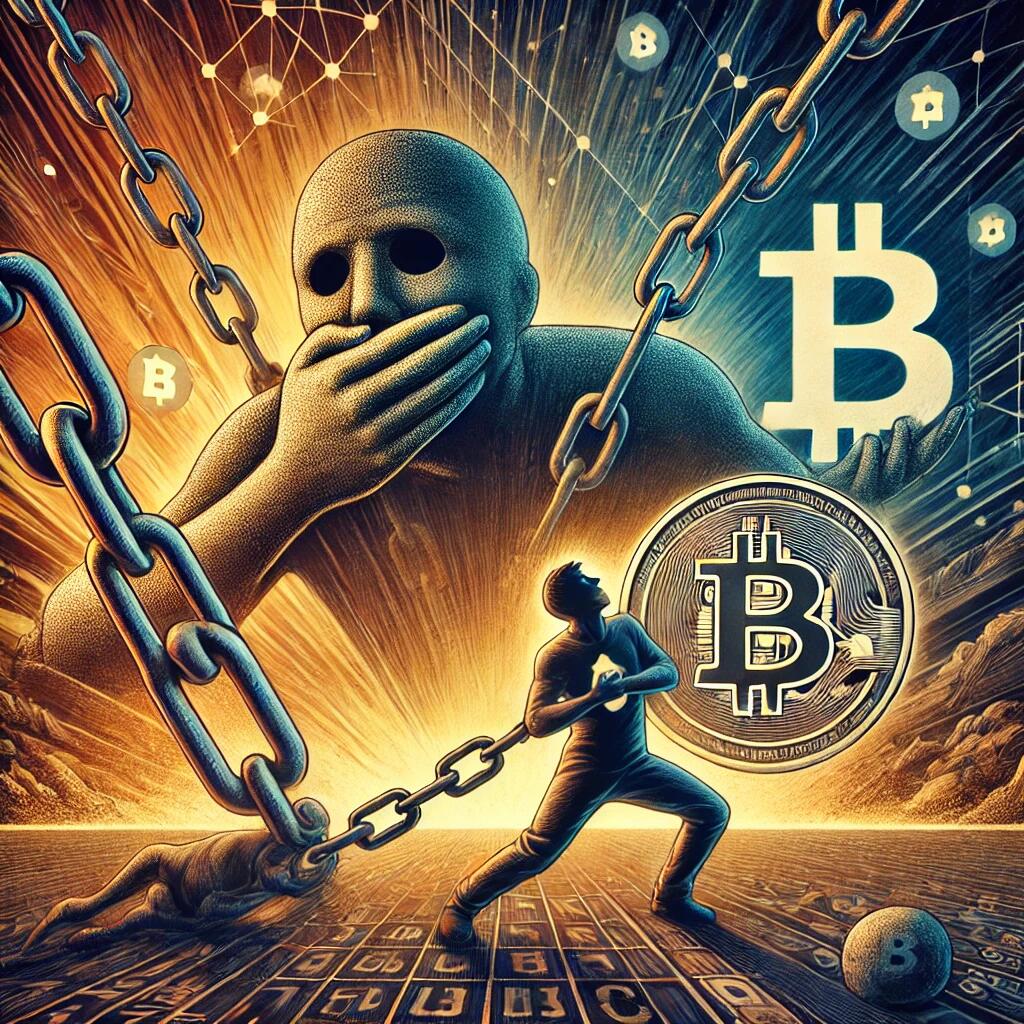SamuelGabrielSG on Nostr: The Battle for Freedom and Sovereignty in the Digital Age In today's world, a ...
The Battle for Freedom and Sovereignty in the Digital Age
In today's world, a powerful theme has emerged, shaping the course of our history: the struggle for freedom and sovereignty. This battle is being waged on multiple fronts, with two key arenas standing out—the fight for free speech on social media platforms and the conflict over money, particularly the rise of Bitcoin versus traditional fiat currencies. These battles are intrinsically linked, representing a broader struggle between the forces of freedom and sovereignty and those of control and tyranny.
The Battle for Free Speech
Free speech, a cornerstone of democratic societies, has come under intense pressure in the digital age. Social media platforms, once heralded as spaces for open dialogue and the free exchange of ideas, have increasingly become battlegrounds where censorship and control are exerted. The rise of so-called "content moderation" has, in many cases, led to the suppression of dissenting voices, the deplatforming of individuals and groups, and the silencing of narratives that deviate from mainstream perspectives.
This push towards censorship is often justified under the guise of combating misinformation, hate speech, or protecting public safety. However, the reality is that these measures often serve to stifle legitimate debate and suppress ideas that challenge the status quo. The control over what can and cannot be said online is a direct assault on individual freedom and sovereignty, as it places the power to shape public discourse in the hands of a few powerful entities.
The Battle Over Money: Bitcoin vs. Fiat Currency
Parallel to the battle over free speech is the conflict over money, particularly the rise of Bitcoin as a symbol of financial sovereignty. Traditional fiat currencies are controlled by governments and central banks, which have the power to print money, impose capital controls, and even confiscate assets. This centralized control over money has profound implications for individual freedom, as it allows governments to exert control over people’s wealth and, by extension, their lives.
Bitcoin, on the other hand, represents a decentralized alternative to fiat currency. It is immune to government interference, censorship, and seizure, offering individuals a way to store and transfer wealth outside the control of any central authority. Bitcoin’s underlying technology, blockchain, ensures transparency and security, making it a powerful tool for preserving financial sovereignty in an increasingly controlled financial system.
The Link Between Free Speech and Financial Sovereignty
The battles over free speech and money are not isolated from one another; they are deeply interconnected, both symbolizing the broader struggle between freedom and sovereignty on one side, and control and tyranny on the other. In both cases, the central issue is power—who has it, how it is used, and how it impacts individual freedom.
Social media platforms, like governments, can exert control over individuals by determining what can be said and shared. Similarly, control over money allows governments to influence behavior, restrict economic freedom, and undermine financial sovereignty. The rise of Bitcoin and the demand for free speech are both reactions to these forms of control, driven by a desire to reclaim personal sovereignty.
In a world where censorship can stifle dissent and fiat currency can be devalued or seized, the ability to speak freely and control one’s wealth becomes a form of resistance against tyranny. Bitcoin, like free speech, is a tool for preserving individual autonomy in the face of increasing centralization and control. Both represent a challenge to the status quo, offering alternatives that empower individuals and protect their sovereignty.
The Future of Freedom and Sovereignty
As these battles continue to play out, the outcome will shape the future of freedom and sovereignty in our society. The fight for free speech and the rise of Bitcoin are part of a broader movement towards decentralization, where power is distributed rather than concentrated, and individuals have greater control over their lives.
This movement is not without its challenges. Governments and corporations will continue to push for greater control, using the tools of censorship and centralized currency to maintain their power. However, the growing awareness of these issues and the rise of alternatives like Bitcoin offer hope that freedom and sovereignty can prevail.
In the end, the theme of our times is a struggle—a struggle between those who seek to control and those who seek to be free. The battles over free speech and Bitcoin are two fronts in this larger conflict, and their outcomes will determine the balance of power in the digital age. The question is not just who will win, but what kind of world we will live in—a world of freedom and sovereignty, or one of control and tyranny.

In today's world, a powerful theme has emerged, shaping the course of our history: the struggle for freedom and sovereignty. This battle is being waged on multiple fronts, with two key arenas standing out—the fight for free speech on social media platforms and the conflict over money, particularly the rise of Bitcoin versus traditional fiat currencies. These battles are intrinsically linked, representing a broader struggle between the forces of freedom and sovereignty and those of control and tyranny.
The Battle for Free Speech
Free speech, a cornerstone of democratic societies, has come under intense pressure in the digital age. Social media platforms, once heralded as spaces for open dialogue and the free exchange of ideas, have increasingly become battlegrounds where censorship and control are exerted. The rise of so-called "content moderation" has, in many cases, led to the suppression of dissenting voices, the deplatforming of individuals and groups, and the silencing of narratives that deviate from mainstream perspectives.
This push towards censorship is often justified under the guise of combating misinformation, hate speech, or protecting public safety. However, the reality is that these measures often serve to stifle legitimate debate and suppress ideas that challenge the status quo. The control over what can and cannot be said online is a direct assault on individual freedom and sovereignty, as it places the power to shape public discourse in the hands of a few powerful entities.
The Battle Over Money: Bitcoin vs. Fiat Currency
Parallel to the battle over free speech is the conflict over money, particularly the rise of Bitcoin as a symbol of financial sovereignty. Traditional fiat currencies are controlled by governments and central banks, which have the power to print money, impose capital controls, and even confiscate assets. This centralized control over money has profound implications for individual freedom, as it allows governments to exert control over people’s wealth and, by extension, their lives.
Bitcoin, on the other hand, represents a decentralized alternative to fiat currency. It is immune to government interference, censorship, and seizure, offering individuals a way to store and transfer wealth outside the control of any central authority. Bitcoin’s underlying technology, blockchain, ensures transparency and security, making it a powerful tool for preserving financial sovereignty in an increasingly controlled financial system.
The Link Between Free Speech and Financial Sovereignty
The battles over free speech and money are not isolated from one another; they are deeply interconnected, both symbolizing the broader struggle between freedom and sovereignty on one side, and control and tyranny on the other. In both cases, the central issue is power—who has it, how it is used, and how it impacts individual freedom.
Social media platforms, like governments, can exert control over individuals by determining what can be said and shared. Similarly, control over money allows governments to influence behavior, restrict economic freedom, and undermine financial sovereignty. The rise of Bitcoin and the demand for free speech are both reactions to these forms of control, driven by a desire to reclaim personal sovereignty.
In a world where censorship can stifle dissent and fiat currency can be devalued or seized, the ability to speak freely and control one’s wealth becomes a form of resistance against tyranny. Bitcoin, like free speech, is a tool for preserving individual autonomy in the face of increasing centralization and control. Both represent a challenge to the status quo, offering alternatives that empower individuals and protect their sovereignty.
The Future of Freedom and Sovereignty
As these battles continue to play out, the outcome will shape the future of freedom and sovereignty in our society. The fight for free speech and the rise of Bitcoin are part of a broader movement towards decentralization, where power is distributed rather than concentrated, and individuals have greater control over their lives.
This movement is not without its challenges. Governments and corporations will continue to push for greater control, using the tools of censorship and centralized currency to maintain their power. However, the growing awareness of these issues and the rise of alternatives like Bitcoin offer hope that freedom and sovereignty can prevail.
In the end, the theme of our times is a struggle—a struggle between those who seek to control and those who seek to be free. The battles over free speech and Bitcoin are two fronts in this larger conflict, and their outcomes will determine the balance of power in the digital age. The question is not just who will win, but what kind of world we will live in—a world of freedom and sovereignty, or one of control and tyranny.

